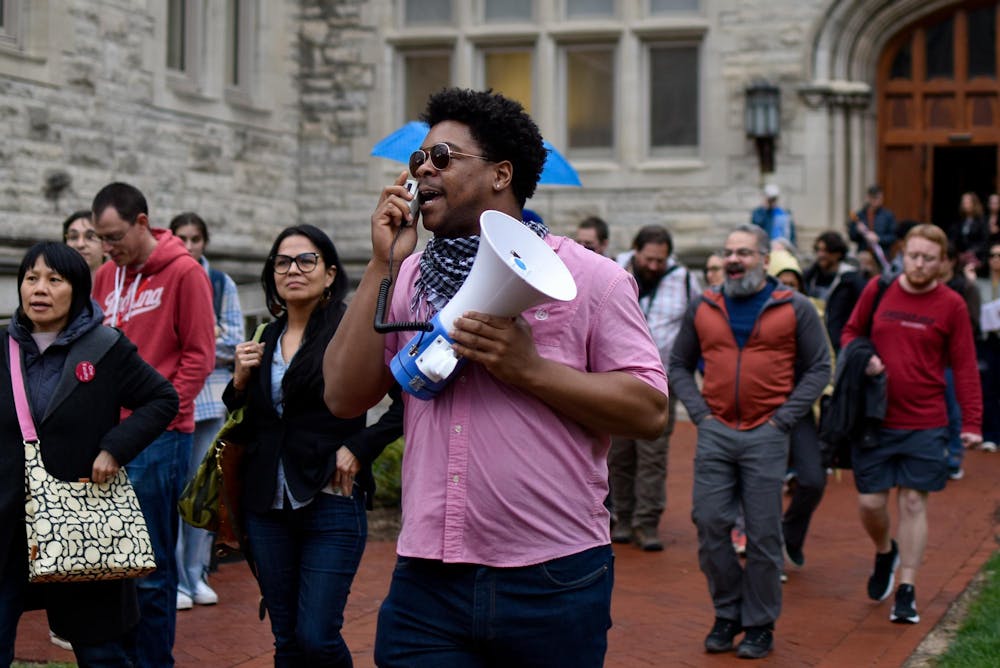A group of around 50 demonstrators gathered for the National Day of Action for Higher Education on Thursday in Franklin Hall. The national event was organized by the American Association of University Professors.
The demonstrators set up tables in the commons with flyers, posters and information about each of the groups participating in the protest. Some demonstrators said they were protesting for academic freedom and free speech, protections for tenure and the termination of faculty without notice.
Maria Bucur, IU history professor and self-proclaimed “master mistress of ceremonies,” said the event was organized by People’s 2030 Platform — a newly formed coalition of IU students, faculty, staff and organizations — in collaboration with the IU chapter of the AAUP.
Chapters of the AAUP across the country organized protests at 178 campuses across 48 states, including ones organized at IU East and IU South Bend.
The IU Bloomington protest brought representatives from numerous IU organizations, including the Palestine Solidarity Committee, Indiana Graduate Workers Coalition, University Alliance for Racial Justice, Green Feather Movement, Friends of Dorothy and Students for a New Green World.
The event was set up with speakers and open tabling, allowing protesters to interact with organizers and learn how to get involved with the organizations represented.
The demonstration began with six representatives from the organizations speaking about the importance of the event and the concerns they had with the university.
Notable speakers included AAUP President Benjamin Robinson, who is currently under investigation for violating “intellectual diversity” requirements under Senate Enrolled Act 202. Other speakers were IU Trustee Vivan Winston, Bloomington City Councilmember Andy Ruff, former student body president-candidate Omeed Mehrzad and Luddy School of Informatics, Computing and Engineering computer science chair Yuzhen Ye.
Ruff played the guitar and sang the song “Deportee (Plane Wreck at Los Gatos)” by Woody Guthrie. He said the song signified what he viewed as similarities between the mistreatment in the media coverage of the deported migrants who died in the song and current events happening today.
Robinson told the IDS the demonstration has “two dimensions,” for both internal and external stakeholders.
“We're trying to communicate to the federal government, to donors, to philanthropists, to lobbyists,” he said, “that higher education is only healthy when it's autonomous, and that autonomy, it's just another word for academic freedom.”
Heather Akou, IU associate professor of fashion design, said she was concerned about potential retaliation from the university, as well as the federal government, but will continue to demonstrate at future events. She said advocating for civil rights and humans is her life work.
She also said some protests on campus have seen some of their “demands” met, such as the recent Indiana Graduate Workers Coalition protest, which resulted in IU outlining steps for students who had their visas revoked.
Ye spoke at the event about the termination of IU professor Xiaofeng Wang and IU Libraries analyst Nalini Ma. She claimed a researcher in China applied for a grant with Wang’s name on it without his knowledge. When IU asked Wang about the grant proposal, she said, he provided documentation to IU.
She also said she was saddened that IU would terminate a faculty member after years of contribution to the university.
The protest ended with a march to Dunn Meadow, where organizers chanted for about 15 minutes.
Bryce Greene, a People’s 2030 Project organizer, said it was hard for IU organizations to get their voices heard by the IU community and administration.
“You are stronger when you’re part of a larger chorus of voices calling for the same thing,” Greene said. “And one of the things that we lacked in the past was a unifying vision that brought together both the graduate workers, Palestine organizers, faculties, staff, all these groups.”
However, he said each group will continue to be separate organizations with their own “work and pace.”
In March, People’s 2030 Project drafted a 27-page strategic plan, that Greene claimed had “100% approval” from representatives from multiple student organizations.
“I think this is the first time at least since I've been in IU that there is a major coalition with a vision that they're willing to fight for,” Greene said.
Greene said he doubts IU administration will want to have a conversation with the group. However, he said if the administration wants to have a conversation, they can look at the plan created and “make the vision a reality.”
Akou said the organization is publicly mailing its initiatives to IU administrators and hopes to have “big conversations.” She added that she participated in developing the IU 2030 Strategic Plan — a seven-year strategic plan to improve education, research, scholarship and creative activity at the university — but believes the plan can be improved.
“The administration has not demonstrated much willingness to listen, which is why we felt like we really had to create an alternative plan,” Akou said. “But I think that there are some really hopeful elements of it that are not represented at all in the administration's 2030 Strategic Plan.”




